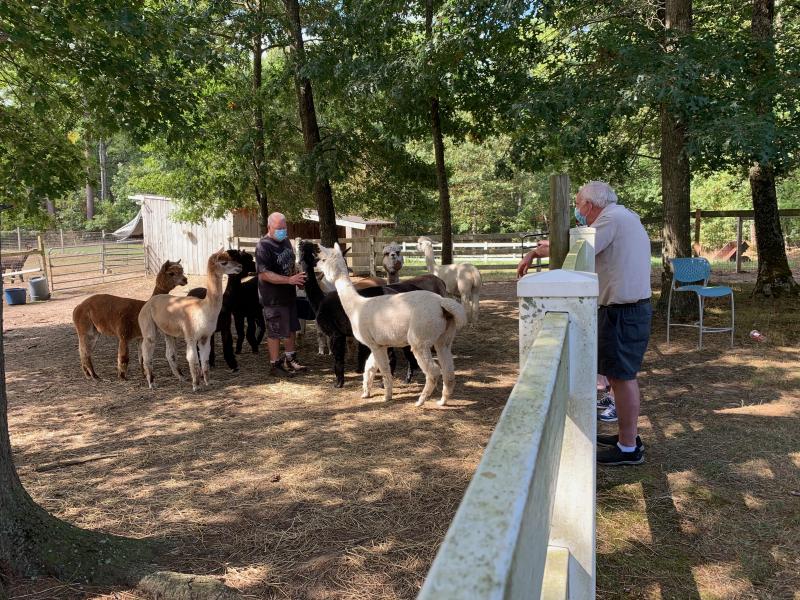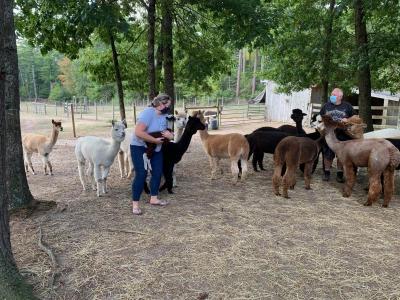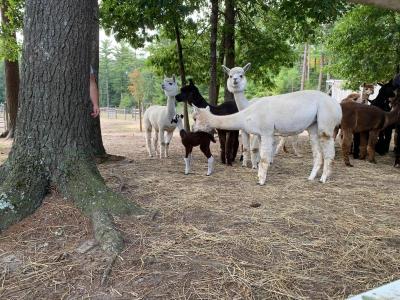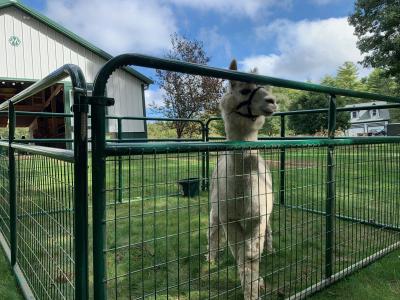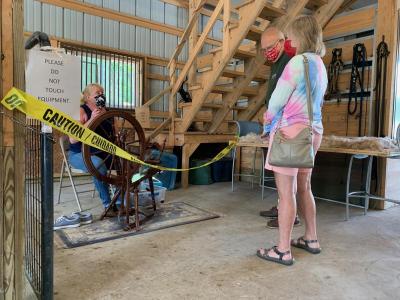A socially distant tour of the Sippican River alpaca farm
ROCHESTER — The Sippican River Farm is normally packed on National Alpaca Farm Days and guests are given fresh homemade cookies and apple cider, but this year visitors made reservations to take socially-distant tours of the farm in 15-minute increments.
Caution tape tied to trees led visitors from a fenced-in parking lot to Bronie Rozenas, who runs the farm along with his wife Cheryl. He used food to lure the farm’s alpacas toward the visitors.
The hungry alpacas swarmed Bronie, each trying to get their heads into the small bucket full of food.
“I just don’t wanna get spit on again,” he said, pushing some of the alpacas away to maintain some sort of order around the bucket.
The farm has over a dozen alpacas, but only three of them are males.
While the females were crowded around the bucket of food, the males were strewn about the farm to keep them from fighting.
“The number one reason to sell all the alpacas is those boys fighting,” Bronie said.
He said the noises the male alpacas make when they fight were enough motivation to keep the farm predominantly occupied by female alpacas.
But it’s not all bad for the male alpacas lucky enough to call Sippican River Farm home.
Napoleon, one of the male alpacas, was fenced in a small enclosure across from where Bronie was feeding the other alpacas and teaching visitors of all ages about the animals.
Bronie said Napoleon usually only spends time in the enclosure when he’s about to get his nails cut, or is lucky enough to get to go on a “date” with one of the female alpacas.
“He loves being there,” Bronie said. “Because he gets a nice, good view of his girls.”
There was only one male who got to live among the female alpacas, but only because he’s a days-old cria who is still nursing from his mother.
“Where’s your kid,” Bronie asked the newborn alpaca’s mother, as if she would have shrugged and given an answer.
After a short search, the newborn was found, and carried back to the visitors and group of female alpacas, who each watched over him like he was their own.
Bronie said he hadn’t put the newborn on social media yet because he originally wasn’t sure how the newborn would fare, as he was premature at birth.
But Bronie said the young alpaca seemed to have turned a corner, and has begun gaining weight.
Now, the family is thinking of names for the newborn. The name has to start with a ‘V,’ per an alphabetical naming convention at the farm. So Bronie said he’s thinking of Vinny or Vincenzo. But one visitor suggested Valiant instead, which Bronie seemed to take into consideration.
The soon-to-be-named newborn’s ears are still curly, unlike the straight ears of all the other alpacas at the farm, which Bronie said was a sign of underdevelopment. Bronie said the newborn may have to get braces for his ears to straighten them if they don’t straighten out naturally.
Visitors got to pet the alpacas and took plenty of photos as Bronie educated them on the animals, which get sheared one per year, and their fleece is turned into yarn, sold as is or knitted into hats and other clothing at the farm.
Even though visits were separated into small groups fifteen minutes apart, the farm had a steady flow of guests.
“It’s been non-stop people making reservations,” Bronie said.
And even though visitors weren’t able to feed the alpacas or receive fresh homemade cookies and apple cider like they have in previous years, the guests nearly unanimously praised the farm and the tour, save for a few children who were afraid to follow their parents’ lead and pet the alpacas.
After applying hand sanitizer, groups of guests shuffled over to the barn, where Cheryl Rozenas gave a demonstration of how the alpacas’ fleece gets turned into yarn.
After a quick explanation and demonstration, guests were sent through the farm store, filled with goods made from alpaca fleece, and sent on their way.
“It’s working very, very smoothly,” Cheryl said in a brief moment between groups of visitors coming through the barn for a demonstration.
Bronie said the farm usually makes most of its money from farmer’s markets, but this year they’ve been staying home and focusing on tours of the farm, costing $5, except on Farm Days, and “treks” costing $35, where visitors get to go on a walk around the 32-acre farm and over to nearby cranberry bogs with the alpacas.
But even though most of the usual markets the farm attends have been cancelled, Bronie said the tours, treks and Farm Days have been pretty popular at a time when many people are looking for something fun, safe and socially distant to do while coronavirus restrictions are still in effect.
“There’s nothing else to do, is there?”



